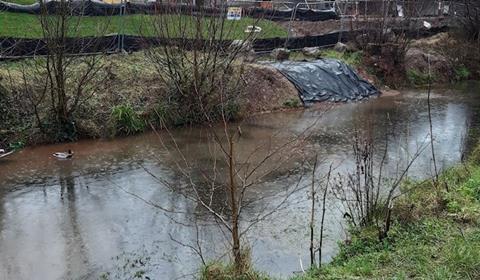Evidence of silt being discharged into rivers was found on a number of occasions in 2021
Housebuilder Taylor Wimpey has been fined nearly £500,000 having been found responsible for multiple incidents of pollution to a Welsh river two years ago.
The £4.3bn turnover firm was found guilty of one charge of breaching environmental permitting regulations at Cwmbran Magistrates Court on last week and fined £480,000.
The court found that contaminated water was illegally discharged into the River Llwyd from Taylor Wimpey’s Edlogan Wharf site near Pontypool between January and October in 2021.

Natural Resources Wales (NRW) inspections revealed that water run-off from the site had been contaminated with silt.
“Environmental regulations are in place to help protect people, wildlife, our rivers, and land,” Susan Lenthall, environment officer for NRW, said in a statement.
“The construction industry has a duty of care to the communities in which they operate, to ensure the correct controls and safeguards are in place in order to prevent incidents such as these occurring.”
She added: “I hope this fine will send out a clear message that environmental legislation is to be taken seriously. We will not hesitate to take appropriate action against those who disregard regulations and jeopardise the natural environment we all know and love.”
Taylor Wimpey said in a statement that it had made “diligent efforts to prevent and remedy surface water issues”.
NRW officers met on site with Taylor Wimpey in February 2021 to discuss the necessary permit application requirements and mitigation measures that needed to be implemented in order to minimise the risk of pollution.
Warning letters were served to Taylor Wimpey on 23 February and 13 May 2021.
Between May and October 2021 there were a further six confirmed incidents relating to pollution caused by silty water discharging from the Edlogan Wharf development .
On 29 October, water samples obtained and analysed by NRW officers revealed a significant increase in the levels of small solid particles in the watercourse, otherwise known as silt.
Silt water can cause damage to the environment and animals, especially fish, because it clogs their gills, and reduces light penetration. It can also contain chemicals, like fuel and oil.
Taylor Wimpey was also ordered to pay £181 surcharge and £8,591 in costs, bringing the total fine to £488,772.
>>See also: ‘We’re victims of short-term policy-making’: Interview with Taylor Wimpey boss Jennie Daly
“Taylor Wimpey has an unwavering commitment to sustainability with a clear strategy to protect and enhance the environment to create a positive contribution to the communities in which we work,” a spokesperson for the company said in a statement.
“We accept the outcome [of the court case] and are pleased the judge recognised that Taylor Wimpey takes its responsibilities seriously including our full cooperation with Natural Resources Wales as well as our proactive attempts to manage this isolated issue.”
“Despite our diligent efforts to prevent and remedy surface water issues, including proactive steps based on specialist advice from environmental experts, Taylor Wimpey recognises that these efforts were not sufficient to mitigate the impact of heavy rainfall and adverse weather conditions impacting the site.
“Whilst there is no evidence of actual harm having been caused, Taylor Wimpey expresses genuine regret for the potential environmental problems this issue could have caused.”




























No comments yet